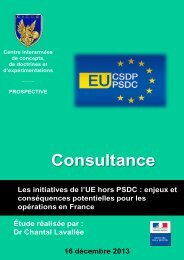Conference
science-research-bulletin-2013-conference
science-research-bulletin-2013-conference
You also want an ePaper? Increase the reach of your titles
YUMPU automatically turns print PDFs into web optimized ePapers that Google loves.
EUROPEAN POLICE SCIENCE AND RESEARCH BULLETIN<br />
SPECIAL CONFERENCE EDITION<br />
the way and the extent to which they are used<br />
by the public and the police alike. It is no surprise<br />
that the research effort has been diffuse and<br />
heterogeneous up to now, and that it has yet<br />
to have a strong impact on practice. There are<br />
a number of observations which may have some<br />
bearing on the further evolution of this work.<br />
Practitioners’ reflections on their work will remain<br />
of great importance in sharing good practice.<br />
Nothing I say here is intended to detract from<br />
that. But there is scope for the academy to work<br />
together with police organisations to create<br />
additional level of analysis and insight. The kind<br />
of activity which I think would inform these<br />
include:<br />
• Ethnographical studies of police social media<br />
behaviours (Skinner 2013);<br />
• Similar studies of social media users which<br />
begin to understand the effect of police<br />
interventions. They might consider for<br />
example how enthusiastic are followers of<br />
police sites, and how impactful are police<br />
interventions?<br />
• Structural approaches to police networks:<br />
who is in them? How do they change over<br />
time, and how do they work? In particular,<br />
how do they work in times of stress, such as a<br />
major incident or a controversial issue?<br />
To do this effectively, there is a need for a more<br />
systematic approach to data collection. An<br />
observatory would benefit from the ability to<br />
formulate research questions and hence data<br />
requirements in advance of incidents. It would<br />
also be a means of creating reassurance that<br />
research ethics were being properly applied in a<br />
transparent matter to the collection and analysis<br />
of the data, and the publication of findings. It<br />
is particularly important for example to bear<br />
in mind the name to protect the interests of<br />
individuals even where the expectation of privacy<br />
is low e.g. if personal details might be revealed<br />
or unsubstantiated allegations be made about<br />
individuals. It is for consideration whether the<br />
COSMOS observatory offers sufficient access to<br />
bulk Twitter data to form the basis of this activity.<br />
It may in any case be necessary to establish more<br />
focussed data collection in order to create data<br />
to understand the evolution of social networks<br />
involving contact between the public and the<br />
police, using both online and survey sources.<br />
REFERENCES<br />
Andrus, Calvin D. ‘The Wiki and the Blog: Toward a Complex Adaptive Intelligence’ Community<br />
Studies in Intelligence, Vol 49, No 3, pp. 63-70 September 2005<br />
Bartlett, J., Miller, C. and Omand, Sir David (2012). #intelligence. Demos ISBN 978 1 906693 08 3<br />
http://www.demos.co.uk/publications/intelligence<br />
Bartlett, Jamie ‘Is social media dodgy evidence or the future?’ (11 January 2013) http://www.nesta.<br />
org.uk/blogs/alliance_for_useful_evidence/is_social_media_dodgy_evidence_or_the_future/<br />
Bartlett, Jamie, Miller, Carl, Crump, Jeremy and Middleton, Lynne (2013) Policing In an Information<br />
Age. http://www.demos.co.uk/files/DEMOS_Policing_in_an_Information_Age_v1.pdf?1364295365<br />
boyd, danah. (2010). ‘Privacy and Publicity in the Context of Big Data.’ WWW. Raleigh, North<br />
Carolina, April 29. http://www.danah.org/papers/talks/2010/WWW2010.html<br />
Burnap, Pete, Housely, William, Morgan, Jeffrey, Sloan, Luke, Williams, Matthew L, Avis, Nick, Edwards,<br />
Adam, Rana, Omer and Williams, Michael Working Paper 153: Social Media Analysis, Twitter and<br />
the London Olympics (A Research Note) (2012) http://www.cardiff.ac.uk/socsi/research/publications/<br />
workingpapers/paper-153.html<br />
Castells, M. (2012). Networks of Outrage and Hope: Social Movements in the Internet Age. Polity.<br />
Kindle edition p.27<br />
Crump, J. (2011). `What Are the Police Doing on Twitter? Social Media, the Police and the Public’.<br />
Policy & Internet 3(4):1-27.<br />
Denef, Sebastian, Kaptein, Nico, and Bayerl, Petra (2013) ‘Social Media and the Police—Tweeting<br />
Practices of British Police Forces during the August 2011 Riots’ Proceedings of the SIGCHI <strong>Conference</strong><br />
on Human Factors in Computing Systems pp3471-3480<br />
112





